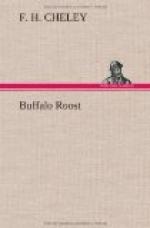“Dad was out on a trapping trip with a group of professional trappers, and, as was the custom, each man had taken with him two good horses, one to carry his share of the hides and his food supply, the other to be used in case of emergency. They were trapping in the Arkansas valley, and after a few weeks out they began to suspect that their camp was being watched by a large band of hostile Indians. They understood the situation perfectly. The Indians were not following them for murder or for a mere fight, but for their horses and furs. They would not attack, however, until they were reasonably sure of getting away with the desired booty without loss of life to their own party.
“The trappers’ hunt had been a very successful one, and a large amount of money was already represented in the heavy packs of fur. Each night these packs of fur were carefully arranged in a big circle, forming a crude rampart for the party. The furs gave the men reasonable safety as they slept, for no arrow, however swift, could penetrate a roll of green hides. The horses were always securely fastened not far from the camp, and guards posted at night.
“Finally the ideal night for attack came. It was dark as pitch, not even a star showing in the cloudy sky. As night fell, it was so stormy that the usual night guard was not deemed necessary. Instead, every man went to sleep. Sometime in the night Dad was suddenly awakened by the pounding of many hoofs on the hard gravel of the valley. In less than a second the entire camp was awake, and every man gripped his rifle in readiness. No one dared to leave the rampart. Safety lay in being all together. The pounding of hoofs grew louder and louder, the picketed horses whinnied, then there was a wild gallop past the little camp, accompanied by fiendish yells. Not a man dared to investigate, for fear of ambush. All that they could do was to patiently await the coming of morning.
“With the first rays of light all looked anxiously toward where the horses had been picketed so carelessly. They were gone, every one of them. A hasty examination told the tale. Under the cover of the intense darkness, the hobbles and the picket ropes had been cut at the pins, so as not to disturb the horses or waken the sleeping trappers. After the ropes were cut, the Indians had ridden pell-mell past the free animals, and they, finding their fastenings gone, had joined the stampede. It was a clever game, and the trappers had lost. What were they to do—fifteen days’ journey from any assistance, and not a horse within a hundred miles?
“As they climbed a hill on the far side of the river, to take a look at the surrounding country, they heard a faint whinny, and there, in the bottom of the gulch, lay one of their horses, stretched at full length. His feet had become entangled in the long picket rope, and he had fallen at the edge of the washout with a badly-broken leg. The party gathered about the unfortunate animal, lamenting the fact that he must be shot to relieve him of his suffering.




